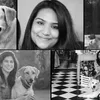Meet the Belgian veterinarian in India who uses Chinese medicine to treat animals
Dr Juliet Decaestecker shifted from Belgium to India with her family in 2017 to treat sick animals with alternative medicine, including Chinese methods.
The health and happiness of a family member is of utmost importance to most of us, and for those who live with pets, there is a similar sentiment.
Seeing pets falling sick or get injured can be difficult and heartbreaking, and one would do anything within their reach to help them recover.
Dr Juliet Decaestecker, a Belgian veterinarian who specialises in Chinese medicine, talks to HerStory about her love for animals, passion for treating them, and her journey so far.
Juliet is also the author of Healthy Dog, Happy You, a book in which she discusses the different ways pet owners can live in harmony with their pets.

Early days
Dr Juliet Decaestecker, who grew up in Flanders, Belgium, has always loved animals, especially her parrot, Koko, that her parents gifted her as a child. When her parents got divorced, she had to give Koko up to her father, because she wasn’t allowed to own pets at the flat her mother rented.
A few months later, she heard that Koko had died, and it was then that she promised herself that she would always look after every animal around her. She went on to rescue every injured animal she came across, and worked hard to learn how she could help them.
Just before she turned 18, Juliet moved into a bigger house with her mother, and adopted a dog, Broel, whom she was very close to, and considered a great friend.
Soon after this, she made up her mind to pursue veterinary medicine, and moved to Liege in South Belgium.
Over the six years she spent studying, she also met her husband Jean Francois, with whom she has four children today.
Seeking alternative methods
After finishing her veterinary studies in 2006, Juliet worked on a farm for three years, practising on small animals. During her time there, she began to wonder why she needed to administer and sell so many different medicines, and questioned whether there was another way to treat animals.
She then approached a veterinarian she had been following for many years, who specialised in acupuncture. She began helping him out in his practice, observing how well the animals reacted to this alternative method.
Soon after this, Juliet spoke to Emiel Van de Bosch, a pioneer of Chinese medicine in Europe, and began learning acupuncture. She started her practice with human beings, and slowly moved to treating animals, eventually expanding to food therapy, Chinese herbs, western herbs and more.
"In alternative medicine, we use different disciplines together. It’s a complete discipline, where we learn to use what is available around us, and it has existed for thousands of years. Traditional medicine across the world are very similar in thought,” she says.

In an interview with HerStory, Juliet talks about her journey so far, the experiences she has had as a veterinarian, and why she chose to practice alternative methods to treat animals.
HerStory: What is your educational and professional background? Do you work independently?
Juliet Decaestecker: I’m a Doctor of Veterinary Medicine, with a postgraduate degree in Chinese medicine at IVAS (International Veterinary Acupuncture Society). I'm also a teacher at BEVAS (Belgian Veterinary Acupuncture Society) in acupuncture and Food Therapy.
I practice by myself or with independent colleagues.
HS: How many animals have you helped so far?
JD: Hundreds, maybe thousands. Every day, I treat all sorts of animals from mammals to birds and other species. It goes from helping the neighbour's cat or dog to needling elephants and turtles.
HS: What are the different cases of ailments you have treated?
JD: It’s an array of things. I would say it’s about prevention of ‘disease’, rather the expression of imbalance, not masking the symptoms. It’s also about lifestyle change, from locomotor problems to internal problems.
HS: How do you meet clients? How do they feel about your methods of treatment?
JD: Clients come through other clients or they find me because, unfortunately, all the allopathy treatments would have failed and their animals are already in a devastating state. Committed owners react very well but it’s often a big lifestyle change for them.

HS: What does a typical day in your life look like?
JD:
No two days are the same. As an independent vet I juggle taking care of the family, being out in the field and being in the consultation room.
What is really important for me is that my family and I live as healthy a life as possible, and practice what we preach. We buy the same for ourselves and our pets, go out to green and clean spaces to spend time with each other.
We lead a simple life and don't surround ourselves with a lot of material things. Screen time is very limited, and we spend as much physical time together as possible, playing games, eating, or cooking together.
HS: What are some simple ways pet owners can make their pets' lives better?
JD: There are so many ways a pet owner can make their pet’s life better.
Keep things simple, give them healthy wholesome fresh food (species-appropriate), take them out in the fresh air, make them exercise. Also, limit chemical and harmful substances on them.
It's also important not to overprotect or pamper them too much. Be firm but gentle so they know their place in the family.
Prevention takes time but it will be the ultimate cure. Otherwise you're just masking disease and symptoms that could have been avoided.
HS: What is the most common challenge a pet owner faces?
JD: They are lost in the “information” available on the internet. They lack simple awareness. We live in a society where we want things fixed quickly. Real healing takes time and commitment. We also have to trust in nature again.
There are mainly two streams that pet owners fall into: first is the ultimate trust in technology and examinations through tests to find out what is wrong, and the other is where people start to ask themselves how they can simply prevent disease or treat it at the root cause.
Pet owners are advertised so many different solutions out there but it's often just a waste of money. There is no magical pill out there but there a lifestyle change is possible.
HS: What is your goal for the next four-five years?
JD:
To spread as much awareness as possible to pet owners and other vets. The ultimate goal is to create a healthier future ecosystem for the next generations.
(Edited by Rekha Balakrishnan)




![[Women in Science] Ramadevi left India for greener pastures, only to return to set up vet school at Banaras Hindu University](https://images.yourstory.com/cs/wordpress/2018/02/ramadevi1.jpg?fm=png&auto=format&h=100&w=100&crop=entropy&fit=crop)




